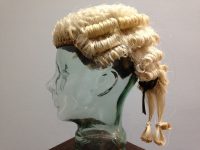Margaret Cunneen: Barristers Are Not an ‘Old Boys’ Club’

Top criminal law barrister Margaret Cunneen SC is used to having the finger pointed at her.
Last year, she found herself the subject of an ICAC inquiry after she allegedly advised her son’s partner, Sophia Tilley, how to influence a breath test after a car accident.
Cunneen was accused of ‘perverting the course of justice’ but denied any wrongdoing, fighting her case all the way up to the High Court, which made history earlier this year when it handed down a decision finding that the ICAC had exceeded its authority in investigating Cunneen’s alleged misconduct.
But it now seems that Cunneen is doing the finger pointing: a few weeks ago, the accomplished Senior Counsel penned a controversial email criticising the NSW Bar Association for its ‘highly partisan forays into the public arena,’ and calling for ‘steps…to be taken to restore the public credibility of the NSW Bar Association, as well as our profession.’
Is the Bar Association Biased?
The Bar Association represents the interests of barristers in New South Wales.
Its stated aim is to:
‘promote the public good in relation to legal matters viewed in the broadest context, promote collegiality and mutual assistance amongst its members, represent the interest of its members to government, the media and the community, promote fair and honourable practice among barristers, and maintain and impose standards of professional conduct and participate in the discipline of members when required.’
But according to Cunneen, the Association has fallen short of achieving these aims in a just and equitable manner. She believes it has adopted an increasingly biased approach to conservative issues, including failing to defend former High Court Justice Dyson Heydon when he was accused by the Labor Party of having a conflict of interest in heading the Royal Commission into Trade Unions.
She has also called it biased for supporting Human Rights President Gillian Triggs, who has repeatedly found herself within the crosshairs of the Federal Government for her National Inquiry into Children in Immigration Detention.
To guard against future bias, Cunneen proposed the establishment of a new media protocol and amendments to the Bar Association Constitution.
She said that the Association’s propagation of the idea that ‘barristers have an attitude to the advancement of women that is ‘ignorant’ and ‘offensive’ is ‘misleading.’ While she acknowledged that the Association should ‘help female barristers,’ she rejected the Association’s apparent self-portrayal as an ‘old boys’ club.’
Cunneen also slammed the conduct of Bar Association members for ‘mimic[king] the behaviour of certain elected politicians’ by putting out media releases and issuing policy statements.
A Matter of Context
Cunneen’s scolding email was sent during the lead up to the 2016 Bar Council elections, where barristers can seek nomination to the Council of the Bar Association.
The Council is currently headed by Jane Needham SC, with Noel Hutley SC and Arthur Moses SC serving as Senior Vice-President and Junior Vice-President respectively. Some have labelled Cunneen’s email an ‘implicit attack’ on the Executive Board.
Despite its fondness for issuing media statements, the Bar Association has not commented on Ms Cunneen’s email – although some barristers have unsurprisingly taken offence to it.
Fellow female barrister, Kate Eastman SC, has commented that while she admires Ms Cunneen, the figures showed that women have traditionally faced greater challenges when it comes to securing barristers’ fees.
But others have voiced their support for Cunneen’s comments – amongst them Jeffrey Phillips SC, a prominent barrister who currently serves alongside Cuneen on the Bar Council. Mr Phillips stated that:
‘The Bar Association wants to be respected by governments of any political persuasion. I don’t think you earn that respect by making comments critical of government which don’t really touch upon the interests of barristers.’
Ms Cunneen’s comments come just months after the Association published an article in her defence in the Winter edition of the NSW Bar News. The article, penned by the Hon Peter Heerey AM QC, considered the elements of the charges against Ms Cunneen, namely ‘perverting the course of justice,’ and concluded that ICAC had acted outside its statutory powers, and that it has nothing better to do than investigate l’affaire Cunneen.’






